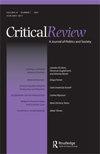福柯与权力:批判与再理论化
IF 1.7
3区 社会学
Q4 POLITICAL SCIENCE
引用次数: 1
摘要
摘要从社会学理论的角度来看,福柯的权力观、权力知识观和纪律观是片面的。虽然福柯认为没有权力中心,但他对权力的描述仍然是自上而下或结构性的,缺少了权力的互动和使能方面。更平衡的观点认为,所有权力的行使都包括有意义的代理(做某事的能力);社会结构(不仅仅是约束,而是互动创造);社会知识(包括具体化真理主张和实现真理或知识);以及社会本体论存在于社会世界中(既作为使能又作为支配)。本文章由计算机程序翻译,如有差异,请以英文原文为准。
Foucault and Power: A Critique and Retheorization
ABSTRACT From the perspective of sociological theory, Foucault’s concepts of power, power-knowledge, and discipline are one-sided. While Foucault contends that there is no center of power, his account of power remains top-down or structural, missing the interactive and enabling aspects of power. A more balanced view would suggest that all exercises of power include meaningful agency (the ability to do something); social structures (not simply as constraints but as interactive creations); social knowledge (including both reifying truth claims and enabling truth or knowledge); and social-ontological being-in-the-social-world (both as enabling and dominating).
求助全文
通过发布文献求助,成功后即可免费获取论文全文。
去求助
来源期刊

Critical Review
POLITICAL SCIENCE-
CiteScore
1.30
自引率
12.50%
发文量
17
期刊介绍:
Critical Review: A Journal of Politics and Society is a political-science journal dedicated to advancing political theory with an epistemological bent. Recurrent questions discussed in our pages include: How can political actors know what they need to know to effect positive social change? What are the sources of political actors’ beliefs? Are these sources reliable? Critical Review is the only journal in which the ideational determinants of political behavior are investigated empirically as well as being assessed for their normative implications. Thus, while normative political theorists are the main contributors to Critical Review, we also publish scholarship on the realities of public opinion, the media, technocratic decision making, ideological reasoning, and other empirical phenomena.
 求助内容:
求助内容: 应助结果提醒方式:
应助结果提醒方式:


